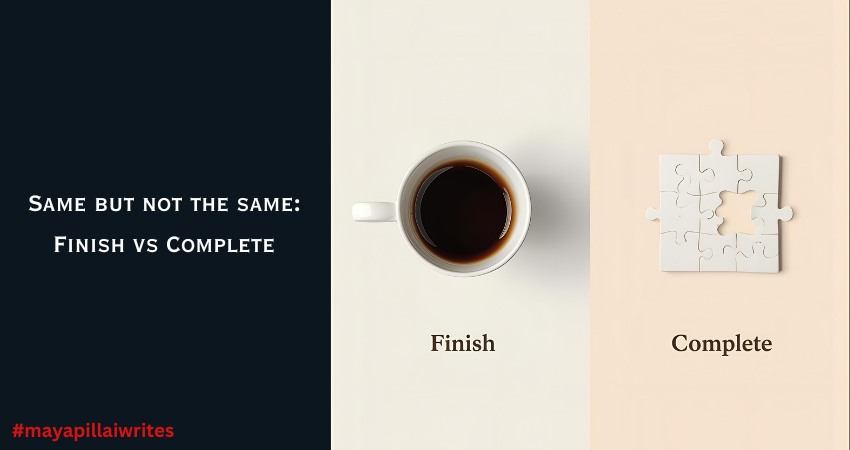Riya, a school student, was writing her English assignment. She wrote, “I have to finish the form before tomorrow.” Her teacher circled the word finish and wrote in red, “Not correct here. Use complete.” Confused, Riya asked, “But aren’t they the same?” The professor explained, “You finish a meal or a movie. But you complete a form or an assignment. One is about reaching the end, the other is about fulfilling every requirement.” That small correction stuck with Riya. She realized that while finish and complete look similar, they aren’t always interchangeable.
Table of Contents
Toggle
When learning English, some words look like twins. Finish and complete often confuse learners because they both suggest something has ended. But they’re not always interchangeable. The difference lies in the focus—finish highlights the act of ending, while complete stresses wholeness. Let’s break it down.
TL;DR
- Finish means bringing an activity to an end.
- Complete means making something whole by doing all parts.
- Use finish for actions, and complete for tasks or requirements.
What Does Finish Mean?
Finish is about reaching the end of an activity. The focus is on stopping or wrapping up, not on covering every detail.
Examples:
- I need to finish my lunch before the call.
- She finished the book last night.
- When will you finish painting the wall?
In all these cases, the idea is that the action came to an end.
What Does Complete Mean?
Complete is about wholeness. It’s used when every part of something is done. It’s also more formal, often used in school, office, or official contexts.
Examples:
- Please complete the form. (fill in all details)
- The project was completed on time.
- The puzzle is finally complete.
Here, the focus is on nothing being missing.

A Quick Comparison Table
Aspect | Finish | Complete |
Meaning | To bring something to an end | To make something whole |
Focus | Ending an action | Fulfilling requirements |
Tone | Informal, daily use | More formal |
Example | I need to finish my coffee | I need to complete my homework |
Phrases with Finish
- Finish up – wrap something quickly.
- Finish off – bring to a definite end.
- Cross the finish line – reach the end of a race.
- Finish strong – end with energy or success.
Example: She wants to finish strong in her exams.
Phrases with Complete
- Complete set – all items included.
- Complete stranger – someone you don’t know at all.
- Complete control – full power or authority.
- Complete silence – absolute quiet.
Example: There was complete silence in the hall.
Practice Time
Try filling in the blanks:
- She couldn’t __________ her essay because she ran out of time.
- I’ll call you after I __________ my work.
- Please __________ the registration form.
- He didn’t __________ the exam; he left two answers blank.
Key Takeaway
- Use finish when you’re talking about ending an action.
- Use complete when you’re talking about fulfilling all parts of a task.
Both words mean something is “done,” but the perspective matters. If you’re just stopping, use finish. If you’re making something whole, use complete.
To Sum Up
The words finish and complete may look alike, but they carry different shades of meaning. Finish is about bringing something to an end, while complete is about making sure every part is done. Understanding this difference can help you write and speak with more accuracy.
Next time you pause before choosing between the two, ask yourself: Am I simply ending an action, or am I making something whole? The answer will guide you to the right word.
👉 Now it’s your turn: try writing two sentences of your own, one with finish and one with complete.
